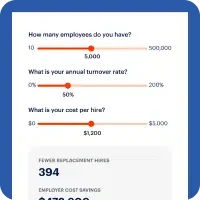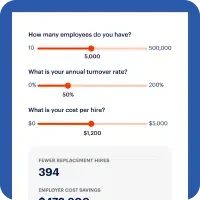Employee turnover is expensive, and in many industries, the cost of losing good workers is rising. Tight labor markets, and young employees job hopping at an increased rate are two proven contributors to turnover increases. Turnover is a meaningful expense for companies who constantly have to recruit new employees and bear the cost of that employee ramping up and becoming productive. According to Glassdoor, it took an average of 52 days and $4,000 to fill an open position in 2016. To keep workers engaged, employers must take special steps to ensure their employees are as productive as possible. For example, employers can implement employee listening strategies or they can promote financial wellness strategies amongst employees.
Companies must intensify their efforts to keep workers engaged. In order to do this, businesses must understand why people quit their jobs in the first place.
1. Lack of financial security
When employees are unable to meet their financial obligations, it’s natural for them to question their job. It’s a simple if-then statement. “If I am not earning enough to sustain myself or my family, then I need to get a new job”. According to Employee Financial Wellness Survey, conducted by PricewaterhouseCooper’s (PwC’s) in 2016, out of 1,600 full-time employees, 52 percent of workers claim to be stressed about their finances. And the younger the worker, the more likely that they are worried. 64 percent of millennials said they feel stressed about their finances. As evidence, according to recruiting firm RecruitingFactors, one of the reasons why agency recruiters leave is due to low pay.
2. Job hopping culture
Is the grass always greener on the other side? Workers pursue new opportunities for many reasons, including aspirations for higher pay, an opposing organization offers better benefits, or out of boredom. A survey by Careerbuilder shows leisure & hospitality, transportation, retail and manufacturing industries tout the largest percentage of employers who expect workers to job-hop. The Bureau of Labor Statistics also shows that younger employees are more likely to job hop than Generation X or baby boomers. Millennials spend about 1.9 years with an organization before seeking a new employer.
3. Lack of company culture
One explanation for millennial turnover could be due to lack of company culture. A study by Deloitte shows millennials regard their employers’ commitment to “corporate responsibility/volunteerism” to be very important, as compared to baby boomers. Millennials are also nearly three times more likely to say a “fun work environment” is important compared to baby boomers (55 percent to 19 percent).
4. They feel overworked
Paychex conducted a study which shows that 63.12 percent of employees surveyed complained that they are overworked. It is possible they feel a lack of adequate salary to match their hours of work put in per week. An effort to retain a healthy work-life balance, or at least financial reassurement, based on the work they put in is another reason why employees quit their jobs.
5. They aren’t engaged anymore
Any of the aforementioned points can start to wear an employee down. Once an employee begins to lose workplace engagement, it’s a matter of time before they quit. It’s also costing you money. A disengaged worker will not be as productive as a happy employee. A study from Gallup shows that lack of productivity affects a business’s bottom line. In fact, it could cost US companies roughly $450–$550 billion, annually.
How can you reduce employee turnover?
It’s important to stay ahead of the curve with your employees and their happiness. Employee turnover costs money. Thus, it becomes the responsibility of the corporation to keep employees engaged and happy. In order to retain employees, even the slightest advantage over other organizations can mean the difference between someone quitting or staying. Utilizing these employee engagement ideas, your company can significantly improve its retention efforts.
Financial wellness strategies such as daily payments could help reduce turnover. According to a recent study conducted by DailyPay, companies that use the technology which allows employees to be paid daily saw an improvement in turnover and engagement. 73 percent of DailyPay users say they feel motivated to come to work. Companies that use DailyPay have seen, on average, a 41 percent reduction in turnover. Applicants were 1.9 times more likely to apply for the job with daily pay versus the job weekly pay. Lastly, applicants were willing to take on average a 13 percent pay reduction for the job that paid daily versus the job that paid weekly. Would you like to learn about how instant payouts, that are not disruptive to your payroll, can improve your employee retention?
Try our cost savings calculator to see how much your company can save in payroll and operating costs by reducing employee turnover after introducing DailyPay to your employees.













